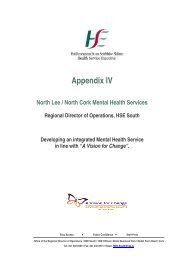<strong>Report</strong> <strong>of</strong> the Commission on Financial Management <strong>and</strong> Control Systems in the <strong>Health</strong> ServiceBox 2: Programmes <strong>and</strong> Care GroupsProgrammes <strong>and</strong> Care Groups are essentially different ways <strong>of</strong> analysing health board activities.Traditionally, each health board is divided into three programmes:●●●Hospital Care (all Acute Hospitals),Special Hospitals (Elderly <strong>and</strong> Mental <strong>Health</strong> cost centres), <strong>and</strong>Community Care (Care Unit cost centres).The Care Group approach, which has become more common in recent years, looks at services from a clientperspective. For example, in the Midl<strong>and</strong> <strong>Health</strong> Board, the following Care Groups are in place:●●●●●Episodic (Acute Hospitals <strong>and</strong> Primary Care),Older People (Services for Older People),Mental <strong>Health</strong> (Community & Residential),Disabilities (Intellectual & Physical), <strong>and</strong><strong>Children</strong> <strong>and</strong> Families (Child Protection & Family <strong>Health</strong>).At all stages <strong>of</strong> the process there are extensive consultations on how service delivery can bemaximised given the available resources. However, the extent to which this process is devolveddown as far as care or clinical service units varies significantly. Within the acute hospitalprogramme, the lowest cost centre for budgetary purposes is generally the hospital itself (insome cases it could be support functions, such as laboratory or radiography, or specialty).Clinicians will agree their activity levels with hospital management, which informs thehospital/health board Service Plan, but there is no link between that activity <strong>and</strong> a budget at thelevel <strong>of</strong> the Clinician. Within the other two programmes (special hospitals <strong>and</strong> community care),the budgets as they st<strong>and</strong> are in many cases already sufficiently devolved, as managers <strong>of</strong> careunits, who have budgets, make the resource consuming decisions.Performance indicators: The health board Service Plans include key performance indicatorsacross a number <strong>of</strong> headings as well as targets for delivery <strong>of</strong> service developments. Costsassociated with delivery <strong>of</strong> these targets are also set out in the plan. These indicators wereagreed between the <strong>Health</strong> Boards Executive (HeBE) <strong>and</strong> the <strong>Department</strong> <strong>of</strong> <strong>Health</strong> <strong>and</strong><strong>Children</strong> <strong>and</strong> relate primarily to health boards’ operational performance across a number <strong>of</strong>headings within all Care Groups. They are output-based indicators, moving towards anoutcome-based scenario. This is consistent with international experience, where outcomebasedindicators are difficult to achieve.Operational Plans: Within each health board, in addition to the formal health board-wideService Plan, each care group (e.g. community care, mental health, etc.), prepares its ownOperational Plan. This underpins the Service Plan, but at a greater level <strong>of</strong> detail, typicallysetting out (i) detailed targets, (ii) departments/individuals responsible for delivery,(iii) performance indicators to assess achievement, <strong>and</strong> (iv) potential bottlenecks. Full yearbudgets <strong>and</strong> the associated staffing complement, analysed by cost centre <strong>and</strong> cost element, arealso part <strong>of</strong> these Operational Plans.166
Appendix 4Ratifying <strong>and</strong> Submitting the Service Plan: The health board’s senior management teamagrees the overall Service Plan <strong>and</strong> presents it to the board’s Finance Sub-Committee. It is thenput before a health board meeting for adoption by the board.When adopted, it is forwarded tothe <strong>Department</strong> <strong>of</strong> <strong>Health</strong> <strong>and</strong> <strong>Children</strong> for Ministerial approval. The Service Plan is generallysubmitted by early/mid January.Once received by the <strong>Department</strong> <strong>of</strong> <strong>Health</strong> <strong>and</strong> <strong>Children</strong>, Service Plans are immediately puton the <strong>Department</strong>’s intranet <strong>and</strong> all line divisions (Secondary Care, Childcare, Services for OlderPeople, Community <strong>Health</strong>, Mental <strong>Health</strong> Division, Services for the Physically <strong>and</strong> IntellectuallyDisabled, Personnel, I.T., Hospital Planning Office etc.) are advised <strong>of</strong> their availability. The financialelement <strong>of</strong> the each health board’s Service Plan is examined by the finance unit to ensure thatit is within determination.The Minister may, within 21 days <strong>of</strong> receipt, direct the health board to make modifications tothe Service Plan.<strong>Health</strong> boards are required to submit a cash pr<strong>of</strong>ile <strong>of</strong> their expected cash drawdown duringthe coming year. This pr<strong>of</strong>ile, the requirement for which is set out in the Letter <strong>of</strong>Determination, must be submitted by the beginning <strong>of</strong> January. The individual health boardfigures are aggregated by the <strong>Department</strong> <strong>of</strong> <strong>Health</strong> <strong>and</strong> <strong>Children</strong>, supplemented by directspending by the <strong>Department</strong>, <strong>and</strong> submitted to the <strong>Department</strong> <strong>of</strong> Finance.IV. SUPPLEMENTARY ESTIMATESUnder government accounting rules, a <strong>Department</strong> which finds itself faced, during the course <strong>of</strong>a year, with a prospective overrun on its aggregate spending or a shortfall in its income, may -subject to the prior approval <strong>of</strong> the Minister for Finance - apply to the Dáil for aSupplementary Estimate. The norm is that <strong>Department</strong>s must live within their allocated budget<strong>and</strong> the Minister for Finance will only sanction a Supplementary Estimate in exceptionalcircumstances.A specific variant to this regime applies in the case <strong>of</strong> the <strong>Department</strong> <strong>of</strong> <strong>Health</strong> <strong>and</strong> <strong>Children</strong>.The <strong>Health</strong> (Amendment) (No.3) Act, 1996 placed a legal obligation on the chief executive<strong>of</strong>ficers <strong>of</strong> the health boards to live within the annual expenditure budgets determined for eachboard by the Minister for <strong>Health</strong> <strong>and</strong> <strong>Children</strong>; if they fail to do so, the excess is carried forwardto the following financial year as a first charge on that year’s expenditure. While the legislationallows for the Minister for <strong>Health</strong> <strong>and</strong> <strong>Children</strong> to vary a determination, it was agreed with theMinister for Finance in 1997 that increases in voted expenditure supported by SupplementaryEstimates would only be allowed in respect <strong>of</strong> specified areas deemed not to be amenable tomanagement/control by the <strong>Department</strong> <strong>of</strong> <strong>Health</strong> <strong>and</strong> <strong>Children</strong> or the health boards.In the context <strong>of</strong> the 2002 Estimates <strong>and</strong> Budgets, the Government approved a proposal fromthe Minister <strong>of</strong> Finance that, for the future <strong>and</strong> commencing in 2002, resources provided to the<strong>Department</strong> <strong>of</strong> <strong>Health</strong> <strong>and</strong> <strong>Children</strong> would be based on the annual cash allocation asdetermined in the Abridged Estimates Volume augmented by any subsequent Budget Dayprovision. In this context, it was further agreed that no requests for Supplementary Estimateswould be considered, save in the following specific areas that were considered not to beamenable to management by the <strong>Department</strong> <strong>of</strong> <strong>Health</strong> <strong>and</strong> <strong>Children</strong>.167
















